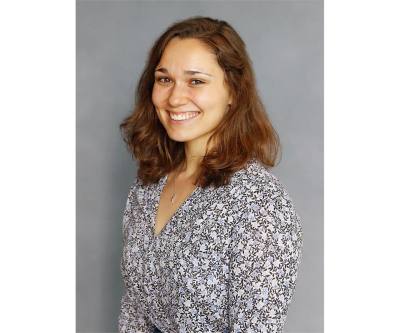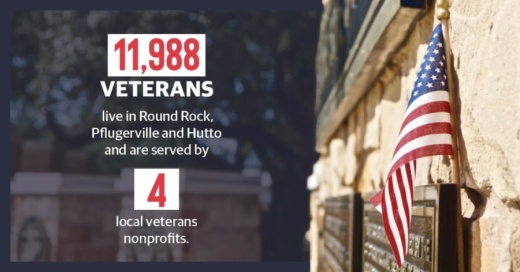On the other end of the line was Williamson County’s coronavirus call center staff, who contacted each of the county’s thousands of veterans. Mitchell said he was asked about his physical safety, financial security and whether he had concerns regarding the pandemic.
“The county was very proactive in reaching out to find out what needs were there and how they could help,” Mitchell said.
While he was personally safe and financially sound, Mitchell said the experience made him reflect on the challenges facing his fellow former service members.
With in-person gatherings limited and amid public health concerns related to the virus’s spread, veterans and the local organizations that support them are absorbing financial and social losses, said Casey Wade, post commander of the PFC Robert P Hernandez Memorial Post 9078, a Veterans of Foreign Wars organization.
“Due to the restrictions that were put in place initially and not being able to raise those funds, it kind of puts a lid on how much we can actually do to assist our veterans in our community,” Wade said.
Financial shortcomings
Four nonprofits serve nearly 12,000 veterans in the Round Rock, Pflugerville and Hutto area, according to 2018 and 2019 U.S. Census Bureau data. Wade said these nonprofits' revenue streams often come through fundraising events, donations or by operating a canteen—a store that sells food or drinks at a military establishment. Wade said his VFW post lacked a canteen, insteading relying on fundraising initiatives such as its poppy flower drives, which are scheduled around Memorial Day and Veterans Day.
Now that his post is relying solely on donations, Wade said his concern with the lack of funding is primarily its effect on the number of veterans the post can financially assist. The American Legion George Johns Post 447, a veteran organization in Round Rock, derives approximately 40% of its funding from its canteen, Manager Steffanie Bartlett said. When bars reopened at reduced capacity May 22, Bartlett said it felt like the first breath she had taken in two months’ time.
Then June 26 came, and bars were forced to shutter their doors once more. The post’s initial closure in March was difficult, Bartlett said; its second was devastating.
“We had to let our patrons and veterans know, which was really hard because they depend on us to be able to have that support daily at the American Legion,” Bartlett said. “They’re all going through different trials and tribulations in their lives, and it’s just good for them to be able to connect with each other.” Under the Texas Alcoholic Beverage Commission, veteran posts are classified as a bar, regardless of whether they derive 51% or more of their funding from alcohol sales. Ultimately, Bartlett said her post voluntarily gave up its license to reopen more quickly to its patrons.
But because the post usually earns more than $100,000 each year through canteen sales, Bartlett said, the loss was significant.
“We get anywhere from 500 to 1,500 requests for veterans assistance a month,” said Don Swayne, Post 447’s finance officer. “And there are several veteran organizations that have just been closed. That means there’s no help being provided to the veterans in our community.”
Care in crisis
Alongside the financial implications of the pandemic, heightened attention has been placed on the mental health of area veterans.
Wade said the nature of VFWs—and a key reason behind their founding—is to provide that sense of community and peer support. For individuals with anxiety, depression, post-traumatic stress disorder or other conditions, Wade said, social isolation is strongly discouraged.
However, given that the pandemic requires social distancing, Wade said that providing support has proven all the more difficult.
“One of the things when it comes to self care and identifying the issue of mental health is trying not to isolate,” Wade said. “And then once you're kind of forced into a situation where you have to isolate, it tends to exacerbate some of those problems and symptoms.”
Post 447 has around 435 members, Swayne said. Since reopening the facility, roughly 25 people have come to the post each day. As compared to March, when more than 100 veterans visited the post daily, that represents an approximate 75% decline in daily social interactions among members, Swayne said.
“We’ve kind of lost our contact [with some members], because we just don’t have those numbers of people coming in here on a regular basis,” Swayne said. “They’re not able to get out, and I’m sure some of them are too scared to go anywhere.”
Sherry Golden, director of the Williamson County Veterans Services department—which called all of the county’s veterans in the spring—said the impetus behind those calls was an interest in veterans’ personal safety. However, through the conversations, Golden said, the focus shifted toward the anxieties veterans had regarding the pandemic.
“They were very scared about what was going on,” Golden said.
She said many area centers have shifted toward virtual and phone visits only, with limited appointments available.
“Most of my veterans that I've been talking to lately said, they just simply didn't go [to their primary care physicians],” Golden said. “I reminded them to please reach out to your doctors, please call the vet center, call the [Veteran Affairs] medical centers—anyone that can help them get to that resource of mental health. But it's very, very limited.”
Forging forward
Wade said his VFW post will host its first hybrid meeting this quarter, gathering via Zoom or socially distanced in person—a sign of a new normal.
The Pflugerville Public Library established VetNow, an online service to help veterans navigate their benefits and transition back to civilian life. Assistant Director Daniel Berra said the pandemic presented anVetNow opportunity to pursue the online platform.
“We've really been taking a look at the community and seeing how the needs have changed during the pandemic,” Berra said. “We recognized that we didn't have a specific [program] aimed at veterans. We felt like it was an important segment of the community that could use support right now.”
While this Veterans Day will have limits for in-person events and ceremonies on Nov. 11, the spirit of the holiday remains, Wade said. Now is as important a time as ever to honor those who served, he said, and to give them the structure, strength and support they need.
“Really the best way to help out our veteran populations is just to support them and the organizations they belong to,” Wade said. “Because having the community rally behind this cause means the world to them.”





